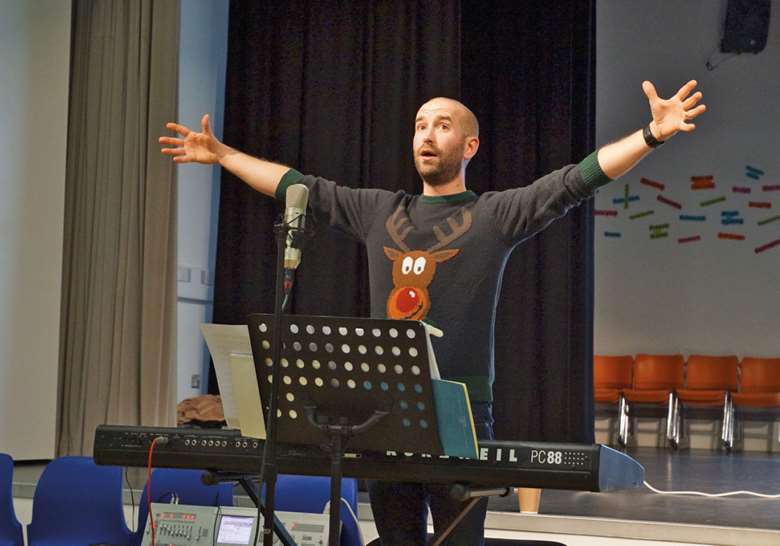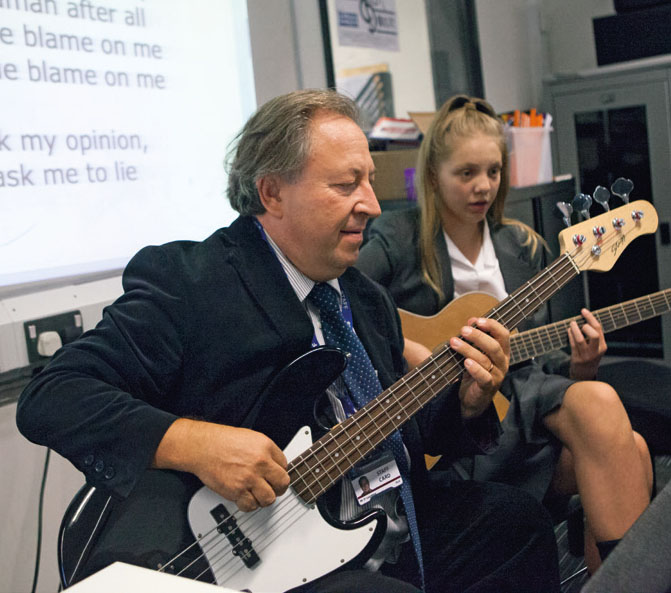Ups and downs: Leading departments
Sunday, April 1, 2018
What is it like to make a difference as a music teacher? MT hears from three teachers on their triumphs and tribulations.

James Manwaring
Director of music for the Windsor Learning Partnership
Teaching music is just the best job in the world. Standing in front of a class of students and sharing the joy and wonder of music is such a privilege and I love that I get to do that every day.
But good grief, it can be tough at times: budget cuts, data-drops, marking, concerts, rehearsals, specification changes, song selection. There are highs but there are also some lows. It doesn't matter what ages you teach, there will always be moments of sheer joy and excitement when you are teaching music, but there will also be times when you wonder if you have still got it in you. It could be that first rehearsal of the year. You have selected some new songs and you are really excited about them. But then you tell the choir what you are singing and they either have no idea what the song is or, worse still, they groan at the mere mention of the title. Or you plan an activity which in your head sounds really fun and engaging, but yet the class just don't want to get on board.
We can agree that it is challenging, and frankly it always will be. But challenging doesn't mean bad or unachievable – it is simply a challenge.
I am passionate about music education. I teach students from Year 1 right up to Year 13 – although I do miss out a few years in the middle. I work with various classes, choirs, groups and ensembles. I really do love the challenge because I can honestly say that in all my years of teaching I have always seen music make a difference to the lives of young people. I have seen first-hand that the hard work is always worth it. Take singing, for example. It is clearly tough in some settings – and indeed in my setting – to get boys to sing. We can talk about it, blog about it, moan about it and worry about it, or we can pursue as many avenues as we can until we see breakthrough. We can try things and fail, and we can use a positive growth mindset to spur us forwards. I think back to the start of this year where I really wanted to get more boys singing. So I made sure that this year we had two rehearsals every week and I just went for it. Boys turned up, which was great, but my issue was song choice. I went for barbershop stuff that was a little tricky, and I needed to learn more about the group before I could really pick repertoire. But hey, I found some good songs and now the group is growing and working really well.
But passion is one thing, and it will get us so far. It will hopefully get the students on board in the first place and it will certainly help us to get through the days and weeks. But on top of passion, it is crucial that we put in place a strategy that will not only develop the young people, but that will develop our departments. A solid musical foundation can only truly be built on a solid strategy. What we teach at Key Stage 1 will have a knock-on effect at Key Stage 5, and how we raise our musicians will determine how successful our choirs and orchestras are. It is all very well being passionate, but we need to think about the future and think about how we can ensure that we are building something. Over the years I have had to try things and then adjust. One of the key strategies that has worked for me is when I rehearse – we do every morning before school for our senior bands and orchestras. This works well in my setting and by 8.30am a great rehearsal has taken place. Overcoming budget cuts has of course been tough, but I have looked at ways of getting funding in by performing for local businesses and groups who are happy to support and sponsor us. I have also put together a team of amazing parents who seek funding and grant opportunities for the department.
If you're a teacher, think to yourself: what are you building in your school? What does the future look like for music and what are you doing to affect it and determine it? What could you change now that would embed a solid foundation of music education in your setting? I am always looking forward and thinking long-term – and thinking big. I want to know that I have future singers and musicians, and now I am even working with Year 1 students who I look forward to seeing grow up with a solid foundation in music education.
Have I got it right? Well, I am not entirely sure, and only the future will tell. But in the meantime, what I am seeing is that music is growing, and numbers involved are rising. The challenge is always to sustain things and that takes time and effort. I strive towards a situation in Windsor where young people have the most amazing musical opportunities and grow up with music education that is right for them and music education that changes their lives.
Perhaps you are working with Year 2, slogging through basic songs – remember that you are laying a foundation. The more we can collaborate, share, inspire and support music teachers, the more we will get students on board. And trust me, passion and enthusiasm do go a long way. A strategy for change is only worth having if you have the young people on-board. Music education changes lives for the better, so make sure you get students on-board with your vision and then go after it, 100%. www.windsorgirls.net www.twbs.co.uk
Heidi Pegler
Deputy director of music at St Paul's Girls’ School
 St Paul's Girls’ School has a great musical tradition. When the school opened in 1904, the first high mistress stated: ‘We intend to make the music of the school of more than ordinary merit.’ To that end she appointed Gustav Holst as director of music. He went on to inspire girls at the school for 30 years, while they in turn helped to shape his compositions: the Brook Green Suite, Hymns from the Rig Veda and several movements of The Planets. It is fair to say that St Paul's Girls’ School remains a singing school. Everyone sings together in the morning assembly. Not only is this a great way to wake up the body, it also gives us a sense of unity by doing something together as a community.
St Paul's Girls’ School has a great musical tradition. When the school opened in 1904, the first high mistress stated: ‘We intend to make the music of the school of more than ordinary merit.’ To that end she appointed Gustav Holst as director of music. He went on to inspire girls at the school for 30 years, while they in turn helped to shape his compositions: the Brook Green Suite, Hymns from the Rig Veda and several movements of The Planets. It is fair to say that St Paul's Girls’ School remains a singing school. Everyone sings together in the morning assembly. Not only is this a great way to wake up the body, it also gives us a sense of unity by doing something together as a community.
There are three non-auditioned choirs, which means that a student can participate in a singing group from the moment they enter the school to the moment they leave. Alongside that, there are two auditioned choirs, but in order to be in one of those the students have to remain in the non-auditioned choir, thereby keeping those choirs vibrant and strong.
I recently asked one of my top choristers why she loved to come to choir practice when there were so many other demands and pressures on her time, and one of the reasons she gave me was because singing (and all music-making) happens in the moment. She is able to focus on one thing – being part of a choir and making wonderful music with others – without the distractions of work and social media.
Our academic music lessons often begin with a class song. We believe that all students should be able to sing as it helps the students internalise music by learning a song aurally.
There is a wide range of abilities in our Key Stage 3 classroom. Some students have reached Grade 8 on their instrument at the age of 11 and others do not play one at all. The challenge is always working with a wide ability range. However, I am encouraged by the enthusiasm with which each student greets each genre of music.
When working on practical tasks we sub-divide our classes into smaller groups and split up our stronger musicians so they can lead and teach others. Singing is a great leveller. The high-flying musician might not have the strongest voice, but what is important is that we all have a voice and with some encouragement we can sing together, whatever our age and ability. This is very liberating and brings us all together as one.
David Laurence
Head of music at St Michael's Catholic College, Southwark
I have been teaching now for 14 years and have found the job very rewarding. Working with inner-city children in a state school has its challenges. However, we're lucky that music is supported by the school's senior leadership team.
The majority of students that join the school in Year 7 have had little to no previous formal musical education. Our school encourages students to start instrumental or vocal lesson when they get here, and they often progress to Grade 5 by the time they are in Year 11 – this gives me a good base for getting students to achieve the higher grades in GCSE music.
I was born into a musical family. My grandad was a viola player in the Royal Philharmonic Orchestra and my mother was a professional harpist and a full-time member of many of the top tv shows, including Top of the Pops, which had their own in-house orchestras. As a child, mum would take me to the pre-recordings for many of the TV shows where stars wanted to mime on the show. I would take my autograph book along, sit in the control room at the studio and get pop stars to sign my book. It all seemed normal to me as a child; I thought many people did this kind of work for a living.
I spent the first 20 years of my career as a freelance French horn player working in orchestras and West End shows. When I decided to move into teaching, I certainly had a lot of musical experience to draw upon. I think this experience was vital to my survival in an inner-city school. More importantly, I feel that I found ways to draw from my experience to bring the classroom curriculum to life for 11- to 16-year-olds. A central factor to success for me is working with students on their level – I research into current trends and make the lessons relevant to them as well as skill-based.

A life in music: David Laurence
When I started teaching, I appreciated the help of several of my colleagues, particularly Nigel Rowlands, who was head of music at the Brit School. He taught me how to understand what gets the best out of students and still ‘ticks the boxes’ in exam criteria. My passion stems from my own experience of the music industry, and my personal need to share the joy of music-making and what I got from my family – that to work in the music industry requires real skill, and is a proper job and a trade. I want my students to believe this and for some of them to perhaps make it a career path of their own.
This article originally appeared in Classical Music March 2018, guest edited by Sing Up's Michelle James.

